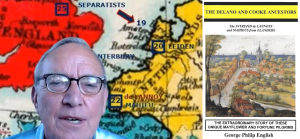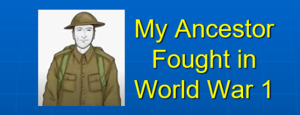The COVID-19 pandemic has made us realise just how important health is to all of us, both our own health and the health of the nation and indeed the world. People ask “How can tracing our ancestors and family history and genealogy help us with this?” The answer is that it can.
As well as genealogy, George English has worked for the National Health Service (NHS) and for worldwide healthcare organizations. He shares these insights about health in the past and how it relates to where we are nowadays.
The pandemic has made us realise just how important health is to all, and the health of the nation. People ask “How can tracing our ancestors and family history and genealogy and research help us with this? We share insights about health in the past and how it relates to where we are nowadays.

Health in the past
Health was a much more precarious thing for our ancestors than it is now because of the staggering medical advances that have been made. The NHS has only existed for 72 years and has made such a dramatic difference. We’ll lead into how knowing about your family roots can help with your health, both individually and in a wider sense.

There have been many disasters in the past affecting people’s health, at the personal, national and international level. So, let’s look at this and what records tell us.
Disease There have been many diseases in the past which have killed millions of people. Tuberculosis, smallpox, measles, cholera, diphtheria, bronchitis – the list goes on and on. Thank goodness, they have now been eradicated or people can be cured.
Child deaths People had large families because they expected a number of their children to die. Causing real distress to the unfortunate parents.
Old age In the 1850s, 50 was an old age. There were all kinds of causes of death that would not happen these days
Slums Living conditions were a big problem for many. From the 18th century, the Industrial Revolution led to people flooding to the towns and cities. London grew in population from 1 million to 7 million during the 19th century. There were millions overcrowded in slums, particularly in the East end of London. Life expectancy there, in the early 1800s, was just 23 years! We put old maps into our reports. They show institutions that we don’t have now, like the Lunatic Asylum and Fever Hospital.
Medical Advances and Lives Saved

Let’s look at the medical advances that have happened. The difference that vaccination has made is simply staggering. In 1800, Jenner discovered the vaccination for smallpox. Smallpox used to kill something like 10% of the population. They estimate that that vaccination has saved over 500 million lives!
From the 1840s, anaesthetics came in to dull pain, which we just take for granted nowadays if we have surgery. They learnt the importance of cleaning things. Louis Pasteur gave his name to pasteurization. Lister, the Scottish surgeon, introduced sterile surgery with the sterilisation of instruments and doctors washing their hands.
Blood transfusions to replace blood that was contaminated with new. In 1926, diptheria and tetanus vaccination came in, saving 60 million lives. Fleming’s discovery of penicillin is calculated to have saved 80 million lives. Salk’s polio vaccine has virtually eliminated polio from the earth. The measles vaccination – 120 million lives saved. These show the phenomenal importance of vaccination and the medical advances that have been made.

The National Health Service
The NHS started in 1948 in the United Kingdom. This life expectancy table shows that, in 1841, the average male lived for 40 years, the average woman, 42 years. Women have always lived longer than men. The graph shows how the age has gone up over time. In 1948 the NHS is started and there was an immediate impact on life expectancy. This was due to health improvements for both young and old. During the 70 years of the NHS, life expectancy has gone up by 14 years! We’re getting much better at preventing things now, testing and finding out before they get too bad; and much better at treating things like heart disease and cancer. Talk about key workers!

This is the world that we now live in. Surveys show that good health is the number one priority for people. Yet 60% of the UK population is now overweight or obese. Just two generations ago, the poorest people were the thinnest. Now they are the most obese. And obesity brings all sorts of problems, heart attacks, Type 2 diabetes, greater risk of death from Coronavirus. There are many problems for someone who is overweight. Half of the costs of the NHS could be saved if people looked after their own health much better.
How Family Genealogy can help with your health

So, how can searching for our family history and roots help us? We can learn from what they died of; child deaths; what conditions they lived in; whether their jobs were unhealthy. We can learn from what our ancestors lived through. “Those who do not learn from history are doomed to repeat it.”
The obvious thing that we can learn from their experience is just how important health is. We can find out where they lived from maps. All of this knowledge can help you in setting goals and strengthening your motivation. For example, losing weight.
A very important question in family history is “what is the evidence for that?” We live in a world of social media where there’s so much uninformed opinion, fake news, deliberate lies. What do we believe? When someone tells us an opinion, we should ask, “What is your evidence for that?” Some people are anti-vaccination. Any evidence for anti-vaccination needs to be balanced against the game-changing impact of vaccination over the last 200 years. We need to strive to be Informed, Objective and Balanced; and Keep Learning. Family history can be beneficial in all sorts of ways and if this helps to make you healthier, then that’s well and good. So please feel free, if you want some help looking into your own family, to get in touch with us.
When you do, we have a free consultation. We look at the information you send us and what we think we’re likely to be able to achieve. And we give you options. Because what’s very important is that you know how much it will cost you and we know how far to go with the research. We’ve got a 10% introductory discount at the moment, just quote Explore 1. And please get in touch. We look forward to helping you and helping you to be healthy. Stay safe.




